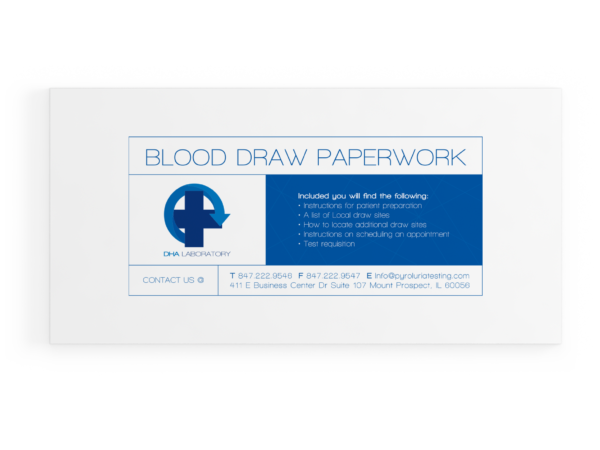Lab Testing
Product Description
**Note: All laboratory testing requires an authorizing physician. DHA Laboratory offers a patient direct program that partners you with an authorizing physician. If you have any additional questions regarding the availability of testing, please contact our laboratory by telephone or email.**
The General Wellness Panel is a low cost comprehensive series of laboratory tests. This panel was developed by working hand in hand with medical practitioners who practice preventative care and promote overall well-being for their patients.
General Wellness Panel
CMP 14 + CBC + Lipid Panel + LDH + GGT + Iron & TIBC + Uric Acid + Glucose + Phosphorus
The Comprehensive Metabolic Panel (CMP 14) is used in the evaluation of organ function and checks for conditions such as diabetes, liver disease, and kidney disease. The CMP may also be ordered to monitor conditions, such as hypertension, and to monitor patients taking medications for any kidney- or liver-related side effects. If a doctor is interested in following two or more individual CMP components, they may order the entire CMP because it offers more information and can give a more thorough assessment.
The Complete Blood Count (CBC) is often used as a broad screening test to determine an individual’s general health status. It can be used to:
- Screen for a wide range of conditions and diseases
- Help diagnose various conditions, such as anemia, infection, inflammation, bleeding disorder or leukemia, to name just a few
- Monitor the condition and/or effectiveness of treatment after a diagnosis is established
- Monitor treatment that is known to affect blood cells, such as chemotherapy or radiation therapy
The Lipid Panel is used to guide practitioners regarding what treatment is best for patients who have borderline or high risk of heart disease. HDL particles are involved in the process of removing excess cholesterol and transporting it to the liver for removal. LDL particles deposit extra cholesterol in the walls of blood vessels. Because of this, HDL particles are known as “good cholesterol” and LDL particles are known as “bad cholesterol”.
LDH is used to evaluate and monitor a number of different diseases and conditions including acute or chronic tissue damage, and different forms of anemia or severe infection. The LDH test can also help stage and monitor treatment such as chemotherapy for several different forms of cancers and germ cell tumors.
GGT is used to determine why a patient would have elevated levels of alkaline phosphatase or also known as ALP. This test would be recommended for any patients with disease associated with the bile duct, and also for patients who have liver or bone disease.
Iron & TIBC is used to aid in the evaluation of a number of conditions involved with red cell production and destruction, iron transport, or iron metabolism.
Uric Acid is used to detect high levels of this compound in the blood in order to help diagnose gout. The test is also used to monitor uric acid levels in people undergoing chemotherapy or radiation treatment for cancer. Rapid cell turnover from such treatment can result in an increased uric acid level. The uric acid blood test is ordered when a health care provider suspects that someone has a high uric acid level. Some people with high levels of uric acid have a disease called gout, which is a common form of arthritis. People with gout suffer from joint pain, most often in their toes, but in other joints as well. The test is also ordered to monitor cancer patients undergoing chemotherapy or radiation therapy, to ensure that uric acid levels do not get dangerously high.
Glucose is used by cells to make energy and is also the main blood sugar. Since glucose is very essential to your cells, the body manages it in many different ways. The most common of those ways is insulin. Insulin delivers glucose to cells throughout the body.
Patient Preparation: A fasting specimen is required. Patients should fast for 12 hours prior to specimen collection. Patients should be on a stable diet for 2-3 weeks prior to collection of blood. The sample should be drawn before patients are given therapeutic iron or blood transfusion. Iron determinations on patients who have had blood transfusions should be delayed for at least 4 days.

